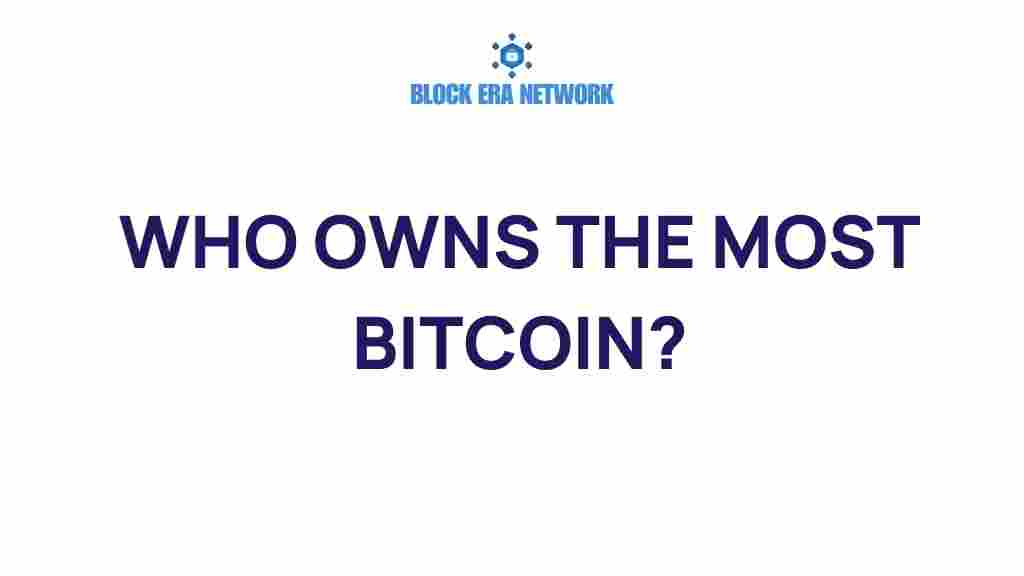Understanding Bitcoin Ownership
Bitcoin, the pioneering cryptocurrency, has not only revolutionized digital payments but has also created massive wealth for early adopters and savvy investors. **Bitcoin ownership** remains a topic of intrigue and speculation as the decentralized nature of the currency makes it challenging to track precise holdings.
In this article, we’ll delve into the fascinating world of Bitcoin, exploring the individuals, companies, and organizations that hold significant Bitcoin fortunes. From mysterious entities to public figures, the distribution of Bitcoin wealth tells an intriguing story of risk, reward, and digital innovation.
Who Are the Largest Bitcoin Holders?
To understand the landscape of Bitcoin ownership, we need to look at three main categories:
- Early adopters and pioneers: Individuals who mined or purchased Bitcoin in its infancy.
- Institutional investors: Companies and funds that see Bitcoin as a store of value or hedge against inflation.
- Unknown or anonymous entities: Wallets with substantial holdings but no publicly known owners.
The Mystery of Satoshi Nakamoto
One of the most enigmatic figures in the Bitcoin world is Satoshi Nakamoto, the pseudonymous creator of Bitcoin. Nakamoto’s identity remains a mystery, but their Bitcoin holdings are well-documented. With an estimated 1 million Bitcoins, Nakamoto’s fortune is worth billions, making them the largest known Bitcoin holder.
This mysterious figure’s inactivity has sparked countless debates, from their possible identity to the potential impact if these Bitcoins were ever moved. Learn more about Bitcoin’s origins in our comprehensive guide to cryptocurrency.
Bitcoin Billionaires: The Known Figures
Several individuals and organizations have amassed significant Bitcoin holdings. Some of the most well-known Bitcoin billionaires include:
- The Winklevoss Twins: Early Bitcoin investors who hold an estimated 1% of the total Bitcoin supply.
- Michael Saylor: The founder of MicroStrategy, a company that has invested heavily in Bitcoin.
- Barry Silbert: Founder of Digital Currency Group, which owns Grayscale Bitcoin Trust.
The strategies of these billionaires range from early investments to corporate acquisitions, showcasing various approaches to building wealth in the cryptocurrency space.
Institutional Bitcoin Ownership
In recent years, institutional interest in Bitcoin has surged, with companies like Tesla, Block (formerly Square), and MicroStrategy investing billions in Bitcoin as a reserve asset. Institutional ownership reflects a growing acceptance of Bitcoin as a mainstream financial instrument.
This trend not only increases Bitcoin’s legitimacy but also impacts its price and market stability. For a deeper dive into institutional Bitcoin strategies, check out CoinDesk, a leading cryptocurrency news source.
How Is Bitcoin Ownership Distributed?
Despite its decentralized nature, Bitcoin ownership is concentrated among a small number of wallets. Studies suggest that:
- Around 2% of Bitcoin addresses control over 95% of the total supply.
- The top 10 wallets hold more than 6% of all Bitcoin in circulation.
- Over 20% of Bitcoin is considered “lost,” locked in wallets with forgotten keys.
This uneven distribution has raised concerns about wealth inequality within the cryptocurrency ecosystem.
Challenges in Tracking Bitcoin Ownership
Tracking Bitcoin ownership is inherently difficult due to the cryptocurrency’s pseudonymous nature. While wallets are visible on the blockchain, identifying their owners is another matter entirely.
Challenges include:
- Anonymous transactions: Many Bitcoin holders prefer privacy, making their identities hard to trace.
- Lost wallets: Bitcoins locked in inaccessible wallets add to the mystery of ownership.
- Complex structures: Institutional holdings are often distributed across multiple wallets for security reasons.
What Does the Future Hold for Bitcoin Ownership?
The dynamics of Bitcoin ownership are evolving as adoption grows and more people recognize its potential as a digital asset. Key trends include:
- Increased institutional participation: Banks, hedge funds, and corporations are entering the Bitcoin market.
- Regulatory developments: Government policies could impact how Bitcoin is owned and traded.
- Global adoption: As more countries embrace Bitcoin, ownership is likely to become more widespread.
The next decade could see significant shifts in Bitcoin ownership, shaping the future of cryptocurrency as a whole.
Conclusion: The Intrigue of Bitcoin Ownership
Bitcoin ownership remains a fascinating and ever-changing subject. From the mysterious Satoshi Nakamoto to institutional powerhouses, the holders of Bitcoin represent a diverse mix of visionaries, risk-takers, and investors.
While tracking precise Bitcoin ownership is challenging, the trends and stories behind these holdings offer valuable insights into the world of cryptocurrency. As adoption grows and regulations evolve, the distribution of Bitcoin wealth will continue to captivate enthusiasts and analysts alike.
This article is in the category and created by Block Era Network Team
